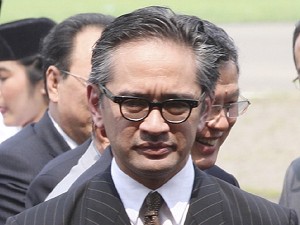Philippines welcomes Indonesia’s effort to mend rifts in Asean
Indonesia’s top diplomat on Wednesday said he received the backing of both the Philippines and Vietnam to push ahead with a code of conduct in the West Philippine Sea (South China Sea) as he pursued his mission of patching up rifts within the Association of Southeast Asian Nations (Asean) over territorial disputes with China.
The 10-nation group could not agree on a concluding joint statement at a ministerial meeting in Phnom Penh, Cambodia, last week, riven with discord over how to deal with China’s increasingly assertive role in the strategic waters of the West Philippine Sea. It was the first time in almost half a century it had failed to deliver a joint communiqué.
The Asean’s reputation for harmony and polite debate was left in tatters by the Phnom Penh meeting.
Welcome effort
One Asean diplomat accused China of buying the loyalty of Cambodia and some other states with economic largesse.
Article continues after this advertisementMalacañang on Thursday said it welcomed Indonesia’s Foreign Minister Marty Natalegawa’s effort to unite the Asean. “It’s important that Asean’s centrality as a regional bloc be preserved,” presidential spokesperson Edwin Lacierda told reporters.
Article continues after this advertisementLacierda said the Asean needed reinvigoration as a regional grouping, but he did not go as far as accusing Cambodia of siding with China in the West Philippine Sea disputes.
“We don’t want to accuse a fellow Asean country,” Lacierda said.
From Manila, Natalegawa traveled to Hanoi and there said he also received backing from Vietnam on his work on the code of conduct. He said he hoped to produce a statement of unity at the end of his trip this week.
The West Philippine Sea has become Asia’s biggest potential military flash point. Beijing’s sovereignty claim over the huge area has set it against Vietnam and the Philippines as the three countries race to tap possibly huge oil reserves.
Not a claimant
Indonesia, the region’s biggest country and one seen as neutral given it has no claim to the disputed waters, has taken on the role of mediator—tasked with drawing up a code of conduct to prevent any acts of brinkmanship spilling over into conflict.
“Unfortunately, last week, there were some difficulties but I believe … what took place in Phnom Penh was an exception, it’s not the rule,” Natalegawa said in Hanoi, the second stop on his regional tour after Manila.
“Let’s keep it that way, let’s keep it as an exception,” he said, adding the divide represented a “critical moment” for the group’s unity.
Natalegawa began an emergency swing through Southeast Asia on Wednesday morning to try to mend rifts within the Asean caused by Cambodia’s blocking the Philippines’ and Vietnam’s efforts to include their territorial disputes with China in the joint statement.
Natalegawa’s first stop was Manila, where he met with Foreign Secretary Albert del Rosario for discussions of key principles for dealing with Asean members’ territorial disputes with China in the West Philippine Sea.
Cambodian challenge
Natalegawa left Vietnam on Wednesday evening for Bangkok. He said he would conclude his trip with a meeting in Phnom Penh to try to convince his Cambodian counterpart to “restore Asean cohesion and unity on the South China Sea.”
Cambodia was at the center of the storm over the failed communiqué, accused of siding with China, which had objected to the mention of a standoff with the Philippines at Panatag Shoal (Scarborough Shoal) in the West Philippine Sea. Beijing maintains the dispute should be resolved bilaterally.
The discord exposed how deeply Asean’s member states have been polarized by China’s rapidly expanding economic influence in the region.
Binding code
Natalegawa said there was a need to push for a binding code of conduct and a declaration allowing for safe passage of ships in the disputed waters.
“The next task [is] to pursue in an aggressive way … the code of conduct on the South China Sea,” he said, adding there was a need “to see the code of conduct adopted now, not in three years.”
“Then we have a benchmark on which to measure the behavior of countries in the region,” Natalegawa said.
The Asean groups Brunei, Cambodia, Indonesia, Laos, Malaysia, Burma (Myanmar), the Philippines, Singapore, Thailand and Vietnam.
In 2002, the regional bloc and China adopted an informal code of conduct in the West Philippine Sea to avoid conflict and ease tensions.
New confrontation
China’s expansive ambition in East Asian waters has taken it to a new confrontation, this time with Russia, which has arrested 36 Chinese fishermen and seized two ships for entering its exclusive economic zone in its far eastern Primorsky region.
The Russian Coast Guard fired warning shots and then opened targeted fire to stop the Chinese vessels.
None of the Chinese fishermen were killed or wounded during the incident.
Won’t do a Russia
Commenting on the incident, Department of National Defense spokesperson Peter Paul Galvez said Thursday that the Philippines preferred a less confrontational approach than Russia’s in handling its own territorial dispute with China.
“We will address the issues peacefully,” Galvez told a news briefing at military headquarters in Camp Aguinaldo, Quezon City. “We believe it would be the more appropriate way to address the issue.” Reports by Christine O. Avendaño and DJ Yap
For comprehensive coverage, in-depth analysis, visit our special page for West Philippine Sea updates. Stay informed with articles, videos, and expert opinions.
